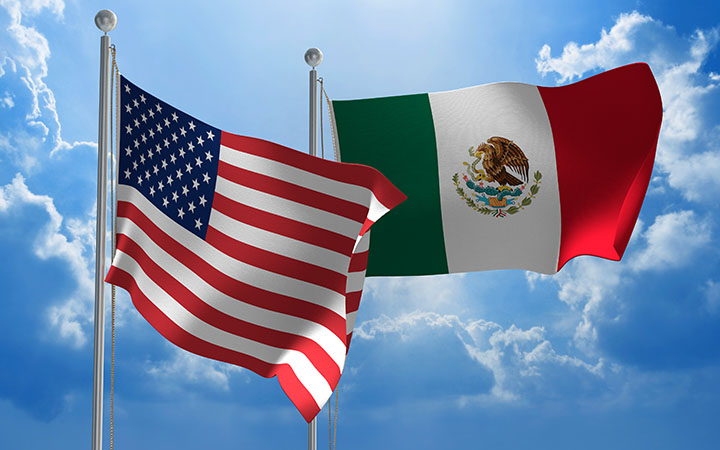For years after the North American Free Trade Agreement (NAFTA) went into effect on Jan. 1, 1994, the trucking industry in the U.S. worried about one particular provision. The agreement called for the lifting of restrictions prohibiting Mexican carriers to operate in the U.S.
Canadian carriers were already allowed to deliver loads originating in Canada to points within the U.S and pick up loads returning to Canada. Mexican carriers, on the other hand, were allowed to operate in clearly defined “commercial zones” near U.S.-Mexico border crossings. Freight from Mexico that was bound for destinations outside of the commercial zones had to be transferred to a U.S.-based carrier for delivery, a process that is cumbersome and expensive.
Since NAFTA was designed to lift trade barriers between the participating countries, it was a given that Mexican trucks would soon be granted the same privileges in the U.S. as Canadian trucks. The treaty provided time, specifying access to Mexican trucks by the year 2000. It didn’t happen.
For Mexican carriers to move goods inside the U.S., they needed to meet the same requirements as U.S. carriers. This included things like obtaining authority, meeting insurance requirements, a driver-licensing system comparable to the CDL system in the U.S., adequate drug-testing and accident-reporting programs, environmental standards and more. Canadian laws governing these areas were already similar to those in the U.S.
Since Mexico is a primary destination for older used trucks when traded by U.S. carriers, there were also concerns about vehicle safety. Critics pointed to the absence of an inspection and grading system in Mexico that was similar to U.S. programs.
Then there was the language barrier. Most Canadians speak English and would have no difficulty reading U.S. road signs or understanding instructions from an enforcement official. A smaller percentage of Mexican drivers speak English fluently, potentially in conflict with a federal regulation requiring a degree of fluency with the language.
Reciprocation was also a possible issue. If Mexican trucks could make deliveries in the U.S., could U.S. carriers make deliveries in Mexico? The problem wasn’t having the authority to do so; the trucking infrastructure in Mexico is simply inadequate for U.S. carriers to operate there. The network of fueling, parking and repair facilities in the country is inconsistent with such services in the U.S.
There was opposition from trucking groups, too, such as the Teamsters Union and the Owner-
Operator Independent Drivers Association
(OOIDA), which were concerned about loss of U.S. driving jobs. Environmental groups such as the Sierra Club and safety advocates like Public Citizen also opposed allowing Mexican trucks on U.S. highways, resulting in an odd confederation of enemies on the same side of the issue.
Meanwhile, the U.S. Department of Transportation (USDOT) and Federal Motor Carrier Safety Administration (FMCSA) struggled to comply with the provisions of NAFTA while ensuring that Mexican carriers met the same safety standards as U.S. carriers. Data was inconsistent, as record-keeping requirements in Mexico did not provide adequate information to guarantee authority approval.
One year after NAFTA went into effect, the U.S. refused to lift restrictions on Mexican trucks, angering Mexico’s government and threatening the NAFTA agreement. Despite this point of friction between the countries, NAFTA remained in effect while the dispute was argued.
In 2001, a NAFTA dispute settlement panel found the U.S. to be in violation of the NAFTA agreement. The following year, the FMCSA put in place an interim final rule allowing cross-border operation. Opponents took to the courts to have the FMCSA rule set aside. Lower courts upheld the rule, but upon appeal the rule was set aside by the U.S. Court of Appeals for the Ninth Circuit; then U.S. Supreme Court overturned the Circuit court, and the rule was back in effect.
The issue moved to Congress, which required in 2007 that a pilot program be implemented to ascertain safety and compliance levels of Mexican carriers before they were permitted to conduct long-haul operations in the U.S. However, two years later Congress voted to remove funding for the pilot program, effectively ending it. Mexico retaliated by placing tariffs on more than $2 billion in U.S. goods.
In 2011, with a new Congress and president in place, another pilot program began, prompting Mexico to suspend its tariffs on American goods.
Finally, in 2015, the data accumulated through the pilot program was reported to Congress, which gave the go-ahead for FMCSA to begin issuing operating authority to Mexican carriers. The U.S. Inspector General reported that the program results were invalid due to the low number of participating carriers, but the carriers that did participate had safety records comparable to U.S. carriers. The numbers were underwhelming, with only a few dozen Mexico-based carriers receiving authority to operate in the U.S.
Finally, after two-and-a-half decades and the involvement of five U.S. presidents, NAFTA was replaced by the new United States-Mexico-Canada Agreement (USMCA), which has been characterized as “NAFTA 2.0.” The USMCA fulfills a campaign promise by President Donald Trump to reform NAFTA and is the result of a renegotiation of the original agreement that took place in 2017 and 2018. It was signed on Nov. 30, 2018, by leaders of all three participating countries, and the final ratification took place in Canada on March 13, 2020.
The USMCA continues the NAFTA provision to allow Mexican carriers to obtain operating authority in the U.S. but allows the U.S. to cap the number of Mexican carriers that are given authority and to halt granting of such authority if it is determined the practice is causing material harm to U.S. interests.
As it stands, the issue of Mexico-based drivers sharing the highways with U.S. drivers has quietly subsided from public discussion. The drivers are still here in small numbers. Cabotage rules prohibit hauling loads between points in the U.S. Predictions of a Mexican force of drivers putting Americans out of work have not come to pass, while the removal of Mexican tariffs on U.S. goods has had a positive effect on U.S. workers. Safety concerns have proven to be largely unfounded, as well, although close monitoring will continue.
Like the trade agreements that authorized cross-border trucking, the rules under which Mexican truckers can operate within the U.S. will change over time. For now, more pressing issues are getting public attention.
Cliff Abbott is an experienced commercial vehicle driver and owner-operator who still holds a CDL in his home state of Alabama. In nearly 40 years in trucking, he’s been an instructor and trainer and has managed safety and recruiting operations for several carriers. Having never lost his love of the road, Cliff has written a book and hundreds of songs and has been writing for The Trucker for more than a decade.















Their taking our jobs
Any official who believes that Mexican carriers are not hurting Trucking Industry,need to take their head out the sand.#1cabatoge is common along border#2rates on freight are not good because of these overwhelming trucks coming from mexico
They are committing cabotage, all the loads just deliver in Laredo Texas and they don’t cross to Mexico like they supposed to and plus all the loads that they steal inside the territory, this is a scam and the politicians know it but they don’t want to do nothing to fix the problem